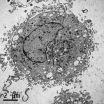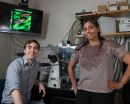Multiple allergic reactions traced to single protein
Points to new strategy to reduce allergic responses to many medications
2014-12-17
(Press-News.org) Johns Hopkins and University of Alberta researchers have identified a single protein as the root of painful and dangerous allergic reactions to a range of medications and other substances. If a new drug can be found that targets the problematic protein, they say, it could help smooth treatment for patients with conditions ranging from prostate cancer to diabetes to HIV. Their results appear in the journal Nature on Dec. 17.
Previous studies traced reactions such as pain, itching and rashes at the injection sites of many drugs to part of the immune system known as mast cells. When specialized receptors on the outside of mast cells detect warning signals known as antibodies, they spring into action, releasing histamine and other substances that spark inflammation and draw other immune cells into the area. Those antibodies are produced by other immune cells in response to bacteria, viruses or other perceived threats. However, "although many of these injection site reactions look like an allergic response, the strange thing about them is that no antibodies are produced," says Xinzhong Dong, Ph.D. , an associate professor of neuroscience in the Institute for Basic Biomedical Sciences at the Johns Hopkins University School of Medicine.
To zero in on the cause of the reactions, Benjamin McNeil, Ph.D., a postdoctoral fellow in Dong's laboratory, first set out to find which mast cell receptor -- or receptors -- responded to the drugs in mice. Previous studies had identified a human receptor likely to be at fault in the allergic reactions; McNeil found a receptor in mice that, like the human receptor, is found only in mast cells. He then tested that receptor by putting it into lab-grown cells and found that they did react to medications that provoke mast cell response. He found similar results for the human receptor that previous studies had indicated was a likely culprit.
"It's fortunate that all of the drugs turn out to trigger a single receptor -- it makes that receptor an attractive drug target," McNeil says.
To find out whether eliminating the receptor really would eliminate the allergic reactions, the research team also disabled the gene for the suspect receptor in mice. These "knockout" mice did not have any of the drug allergy symptoms that their genetically normal counterparts displayed.
The researchers are now working to find compounds that could safely block the culprit receptor in humans, known as MRGPRX2. Such a drug would not prevent true allergic reactions, which produce antibodies, but only the pseudoallergic reactions triggered by MRGPRX2. Still, it could improve the lives of many patients, says McNeil, by lessening the drug side effects they currently endure. Medications that trigger MRGPRX2 include cancer drugs cetrorelix, leuprolide and octreotide; HIV drug sermorelin; fluoroquinolone antibiotics; and neuromuscular blocking drugs used to paralyze muscles during surgeries.
Dong's research group is also looking into the possibility that MRGPRX2 could be behind immune conditions such as rosacea and psoriasis that don't stem from medication use.
INFORMATION:
Other authors on the paper are Priyanka Pundir and Marianna Kulka of the University of Alberta, and Sonya Meeker, Liang Han and Bradley J. Undem of The Johns Hopkins University.
[Attachments] See images for this press release:

ELSE PRESS RELEASES FROM THIS DATE:
2014-12-17
Researchers found 53 existing drugs that may keep the Ebola virus from entering human cells, a key step in the process of infection, according to a study led by researchers at the Icahn School of Medicine at Mount Sinai and the National Institutes of Health (NIH), and published today in the Nature Press journal Emerging Microbes and Infections.
Among the better known drug types shown to hinder infection by an Ebola virus model: several cancer drugs, antihistamines and antibiotics. Among the most effective at keeping the virus out of human cells were microtubule inhibitors ...
2014-12-17
Researchers from Intermountain Medical Center in Salt Lake City have identified a new "sliding scale" model used to rule out potentially deadly blood clots in the lungs, known as pulmonary embolisms, that is more accurate than current diagnostic methods.
The new model, which factors in a patient's age, more accurately identifies a patient's risk of the often-deadly blood clots and can more easily rule out the need for additional, more invasive tests, helping to reduce unnecessary costs.
The research is published in the medical journal, CHEST.
Pulmonary embolism is ...
2014-12-17
The engineered spring flood that brought water to previously dry reaches of the lower Colorado River and its delta resulted in greener vegetation, the germination of new vegetation along the river and a temporary rise in the water table, according to new results from the binational team of scientists studying the water's effects.
The experimental pulse flow of water was the result of a U.S.-Mexico agreement called Minute 319.
"The pulse flow worked," said Karl W. Flessa, co-chief scientist for the Minute 319 Science Team. "A small amount of water can have a big effect ...
2014-12-17
New research helps explain a paradoxical effect of certain antidepressants--that they may actually worsen symptoms before helping patients feel better. The findings, highlighted in a paper publishing online December 17 in the Cell Press journal Trends in Cognitive Sciences, may help investigators fix the problem as well as create new classes of drugs to treat depression.
Selective serotonin reuptake inhibitors (SSRIs) are the most widely prescribed class of antidepressant drugs, and they work by increasing levels of a brain chemical called serotonin. While this boost ...
2014-12-17
In an article to be published in the January issue of BioScience, two philosophers tackle one of the most divisive arguments in modern biology: the value of the theory of "kin selection."
Kin selection is the idea that because genes influence behavior, and because an animal that helps its relatives helps to spread genes likely identical to its own, animals will evolve to favor kin. Researchers have spent decades testing this explanation for apparent animal altruism, but in recent years, critics, notably Martin Nowak of Harvard University and the famous naturalist and ...
2014-12-17
(PHILADELPHIA) - Researchers look to understand the causes of amyotrophic lateral sclerosis (ALS), in the hope of finding new ways to treat the disease. A new study published online today (December 17th) in the Cell Press journal Neuron shows that a common gene mutation in ALS generates a deadly protein that may cause the damage in the brain that leads to ALS.
About 5 percent of ALS patients carry an altered version of a gene called C9orf72, which in ALS patients contains hundreds of repeat sequences that otherwise are not present in normal individuals. Since the gene's ...
2014-12-17
When faced with making choices, but lack sufficient evidence to guarantee success, our brain uses elapsed time as a proxy for task difficulty to calculate how confident we should be, a team of neuroscientists has found. Their findings, which appear in the journal Neuron, help untangle the different factors that contribute to the decision-making process.
"In our daily lives, we make many decisions," says Roozbeh Kiani, an assistant professor in NYU's Center for Neural Science and one of the study's authors. "Sometimes the evidence afforded us is strong, enabling us to ...
2014-12-17
More than 90 percent of cancer-related deaths are caused by the spread of cancer cells from their primary tumor site to other areas of the body. A new study has identified how one important gene helps cancer cells break free from the primary tumor.
A gene normally involved in the regulation of embryonic development can trigger the transition of cells into more mobile types that can spread without regard for the normal biological controls that restrict metastasis, the new study shows.
Analysis of downstream signaling pathways of this gene, called SNAIL, could be used ...
2014-12-17
PITTSBURGH--A stream runs through it. A much nicer, healthier stream.
Pittsburgh's Frick Park is home to Nine Mile Run, a stream that had been known as "Stink Creek." From 2003 to 2006, the City of Pittsburgh and the U.S. Army Corps of Engineers poured $7.7 million into restoring 2.2 miles of the stream and tributaries into waterways approximating what they were prior to urban development.
The project remains one of the largest urban-stream restorations undertaken in the United States.
What can this restoration teach us as we continue to deal with streams affected ...
2014-12-17
WASHINGTON - National Poison Control Center data from 2012 show that poisonings from prescription drugs are the leading cause of injury death in the United States, and that poisonings from "bath salts," synthetic marijuana and laundry detergent pods are emerging threats to public health. The paper was published online Monday in Annals of Emergency Medicine ("Poisoning in the United States: 2012 Emergency Medicine Report of the National Poison Data System").
"The poison center system can provide real-time advice and collect data regarding a variety of poisonings, including ...
LAST 30 PRESS RELEASES:
[Press-News.org] Multiple allergic reactions traced to single protein
Points to new strategy to reduce allergic responses to many medications


